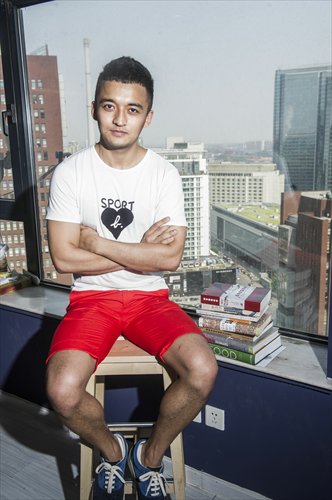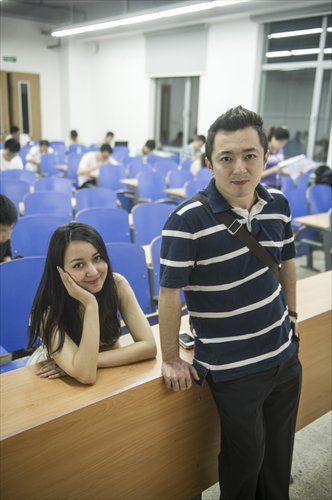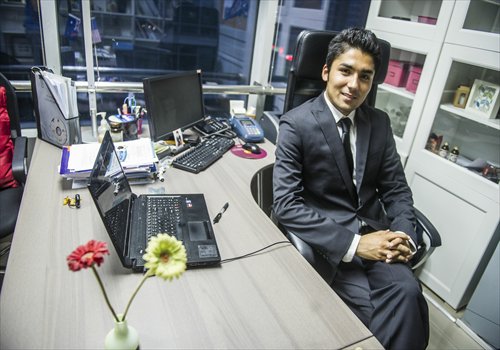Xinjiang’s corporate generation
Abdulhabir Muhammad is a young Uyghur man living in Beijing who doesn't fit the stereotype many associate with his ethnic group. He doesn't sell nut cake, barbecue skewered meats or perform in a musical troupe for TV show galas. Clean-shaven and dressed in a sharp suit and tie, Abdulhabir is the chief operating officer of Beijing Hold International Educational Consulting. The startup, based in tech hub Zhongguancun, Haidian district, provides support services for young people wanting to study abroad.
Abdulhabir had such an opportunity when he attended the State University of New York (SUNY) at Binghamton, where he graduated with a Master's of Business Administration (MBA) in January. Rather than staying abroad, he decided the best place to launch his career was in Beijing.
"I want to be an international businessman and show people that we, as Uyghurs, are more than just vendors who wear 'flower hats' and sell kebabs, naan and nut cake," said Abdulhabir, referring a cap worn by many Uyghur men also known as a doppa. "Unfortunately, many people don't realize there are other business possibilities."
Abdulhabir is one of many young Uyghurs pursuing his professional aspirations in Beijing, where there is greater employment equality and more business opportunities than most other parts of the country.
Despite the backlash being experienced by many Uyghurs in the wake of terrorist attacks by separatists over the past year, Abdulhabir and others like him haven't been deterred to follow their dreams and counter suspicion with personal success.

Entrepreneur Ilham Issak, 25, already has a successful smartphone app and online news magazine to his credit. Photo: Li Hao/GT
Excelling through education
Born in Aksu Prefecture in the Xinjiang Uyghur Autonomous Region, Abdulhabir learned at an early age education was a gateway for opportunity. "People in my county are very poor, but they value education dearly. The biggest gap between Xinjiang and the rest of the country is in education," he said.
In 2005, Abdulhabir was among 5,000 Xinjiang middle school students chosen to study at prestigious high schools in first-tier cities under a pilot program by the Ministry of Education. Abdulhabir attended Luhe High School in Tongzhou district.
In January, his family and eight businessmen collectively set up the Rawa Fund, an education trust to financially support young people from Abdulhabir's native Heping county aspiring to pursue postgraduate studies. It also inspired him to take his chosen career path and help others access the same opportunities he had.
"After graduation, I worked as an audit manager with the New York City Office of the Comptroller. I found that my real passion was starting my own business, so I enrolled in an MBA specializing in entrepreneurship," said Abdulhabir, who also runs an Aksu-based trading company with his brother that provides supermarkets nationwide with halal fast food.
Abdulhabir's temptation to stay in the US after graduation was made stronger by various employment opportunities, but he knew his destiny as a businessman was in his homeland.
"I always wanted to return to China. As the youngest son in my family, I want to live near my parents. More importantly, I am passionate about education and understand the long-term prospects of developing an overseas education consultancy firm in China," he said.
Abdulhabir heads a team of around 20 at Beijing Hold International Educational Consulting, which was founded in March. Behind his office desk are memories of his time in the US, including sports pendants and a collage of photos.
"Some people wonder why I am so hard-working, but it's very simple," he explained.
"Uyghurs are a small group among Chinese people. You have to behave well because once you behave badly, it brings shame to our minority. I'm proud of my heritage as a Uyghur, and want to prove that we can be as successful as those on Wall Street."

Dilaram Abdurazak and her boyfriend Alip Yakup believe Beijing is the best place for young Uyghurs to pursue their business dreams. Photo: Li Hao/GT
Young media mogul
Ilham Issak, 25, shares a similar dream of making his fortune as an entrepreneur. Not long after returning from his studies in Australia in June 2013, the Urumqi native launched new media startup Elephant Magazine.
The online venture provides independent news and analysis daily via social media platforms WeChat and Sina Weibo.
Since reporting its first story in December 2013, it has accumulated around 200,000 subscribers on WeChat and a similar number of followers on Weibo.
After his sophomore year at Beihang University, Ilham continued his studies in electronic engineering at the University of New South Wales (UNSW) in Sydney in 2010.
After graduating from UNSW, he and a friend in Australia launched their own business by developing Pets Around, a social networking app for pet owners that has over 20,000 users.
In the wake of the app's explosive popularity, Ilham was introduced to the idea of branching into online media by friend Huang Zhangjin, editor-in-chief of Elephant Magazine and the former executive chief editor of news magazine Phoenix Weekly.
"The process of launching [Elephant Magazine] was far more smoother than the app because we secured 3 million yuan ($470,960) in venture capital [from angel investors]," said Ilham, adding his next plans for the online magazine involve developing an app and expanding news coverage into videos to generate advertising revenue.
"The entrepreneurial environment is ideal for Uyghurs who want to start out in the mobile tech industry. However, you can't have a 'heart of glass' that shatters easily by instinctively blaming failure on discrimination against Uyghurs," added Ilham.

Abdulhabir Muhammad hopes to pave the way for more young Uyghurs to realize their business aspirations and widen their career horizons. Photo: Li Hao/GT
Inspired by pioneers
As more young Uyghurs spread their wings in the business world, their success provides inspiration to students hoping to follow in their footsteps.
Dilaram Abdurazak, a 23-year-old fresh graduate of Beihang University, experienced a roller-coaster journey before she was employed as a contract management specialist for China Hewlett-Packard earlier this year. Dilaram, an information management major who will graduate in July, is the only Uyghur employee at the company.
Since last year, Dilaram, from Aksu, worried that her employment prospects would be hurt by the stigma faced by Uyghurs linked to separatism. "I feared that many people would have a negative impression of Uyghurs after the attacks, and worried this would affect my ability to find a job," she said.
Dilaram compared the experience of attending job interviews with "dancing on the ice," but her breakthrough came in March when she was hired by China Hewlett-Packard.
On March 1, terrorist attack happened in Kunming that claimed 33 lives and injured more than 140 people.
"The attack did not influence my landing the job as I am worried. After the attack, I knew firmly that at least in Beijing I could be treated equally, regardless of my ethnicity or gender," said Dilaram.
Defeating discrimination
Supporting Dilaram is her boyfriend, Alip Yakup. One of the 26-year-old's most notable attributes is his thick Beijing accent, acquired after his parents moved from Xinjiang to the capital when he was an infant.
Since graduating from the Capital University of Economics and Business in 2010, Alip has worked as a salesman at an international trading company. He is also the administrator of the "Xinjiang people in Beijing" account on Sina Weibo, which has nearly 16,000 followers.
"Although I didn't grow up in Xinjiang, I love it very much. I want more people to know the other side of this region," said Alip.
Asked about his future plans, Ilham said he hopes to continue building his career in Beijing. He insists his "strong heart" will help him along the way and doesn't expect any sympathy or token support on account of his heritage.
"In the past, I would get into heated online debates about Xinjiang issues. Now, I am more tolerant of different voices," he said.
"Apart from barriers we face in applying for visas and passports, none of my white-collar Uyghur friends or colleagues have complained to me about discrimination. Discrimination exists, but I think stereotypes are to blame due to limited understanding [about Uyghurs]."
Newspaper headline: Young Uyghurs cast aside ethnic tension to discover potential in business world